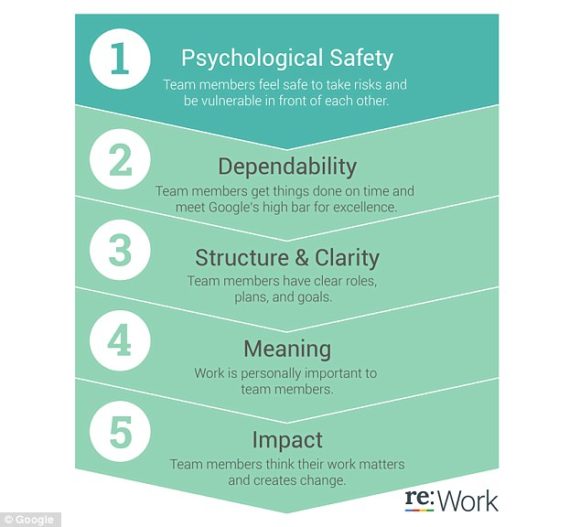Leadership literature is littered with models, lists and quick fixes. I understand that we, the consumers/leaders, seek assurances to guide our own practice however distilling leadership in this manner seem wholly inadequate to me.
That said, this morning, I followed a signpost to Project Aristotle, Google’s investigation to codify organisational team effectiveness. Specifically, Google wanted to know why some teams excelled while others fell behind. Now it would be fair to say that Google has real pedigree for working with data and as the world’s second most valuable brand (Apple being No1), I felt that I should at least do a little research. Google’s reWork and Youtube were excellent sources of information.
Google Project Aristotle Background
-
- Data was gathered and assessed from 180 Google teams.
- Two-year long effort started in 2012; conducted 200-plus interviews, and analyse over 250 different team attributes
Google Project Aristotle Background and Findings
- No patterns were detected to correlate why some succeeded and others didn’t. Homogeneous team, even teams with some of the same members demonstrated varying results.
- Metrics like personal friendships, strong management, team structure, personal interests, gender, longevity provided no clear insight.
- Group norms were found to be key to team success. Group norms are unwritten and often unspoken rules guiding the behaviour of the teams.
- A group of superior individuals was less important than the collective ability of the team.
The researchers found that what really mattered was less about who is on the team, and more about how the team worked together.
Of course, the findings were then distilled in a top five list. In order of importance:
-
- Psychological safety: Organisational behavioral scientist Amy Edmondson first introduced the construct of “team psychological safety.”
Psychological safety refers to an individual’s perception of the consequences of taking an interpersonal risk or a belief that a team is safe for risk taking in the face of being seen as ignorant, incompetent, negative, or disruptive. In a team with high psychological safety, teammates feel safe to take risks around their team members. They feel confident that no one on the team will embarrass or punish anyone else for admitting a mistake, asking a question, or offering a new idea.
Google’s reWork also provides an interesting guide to fostering great psychological safety.
- Dependability: On dependable teams, members reliably complete quality work on time (vs the opposite – shirking responsibilities).
- Structure and clarity: An individual’s understanding of job expectations, the process for fulfilling these expectations, and the consequences of one’s performance are important for team effectiveness.
- Meaning: Finding a sense of purpose in either the work itself or the output is important for team effectiveness. The meaning of work is personal and can vary: financial security, supporting family, helping the team succeed, or self-expression for each individual, for example.
- Impact: The results of one’s work, the subjective judgement that your work is making a difference, is important for team. Seeing that one’s work is contributing to the organization’s goals can help reveal impact.
The researchers also discovered which variables were not significantly connected with team effectiveness “at Google:”
- Colocation of teammates (sitting together in the same office)
- Consensus-driven decision making
- Extroversion of team members
- Individual performance of team members
- Workload size
- Seniority
- Team size
- Tenure
The second area I found interesting was exploring the comment – “How the team works is more important that who is on the team.”
When I explored further, two behaviours are emphasised.
- Equality in Conversational Turn-Taking
During a meeting, if everyone speaks roughly the same amount, then that team is much more likely to succeed. - Ostentatious Listening
Besides encouraging everyone to speak-up more, team members and team leaders need to demonstrate that they are listening. For example, repeating what a team member just said, or setting down your phone and making eye contact.
“Equality of conversation turn taking” and “ostentatious listening” lends itself or leads to Psychological Safety.
Take what you can from the distillation process. For me creating such a short lists feels sterile whereas the description of “Psychological Safety” feels complex and human.
[qr_code_display]


